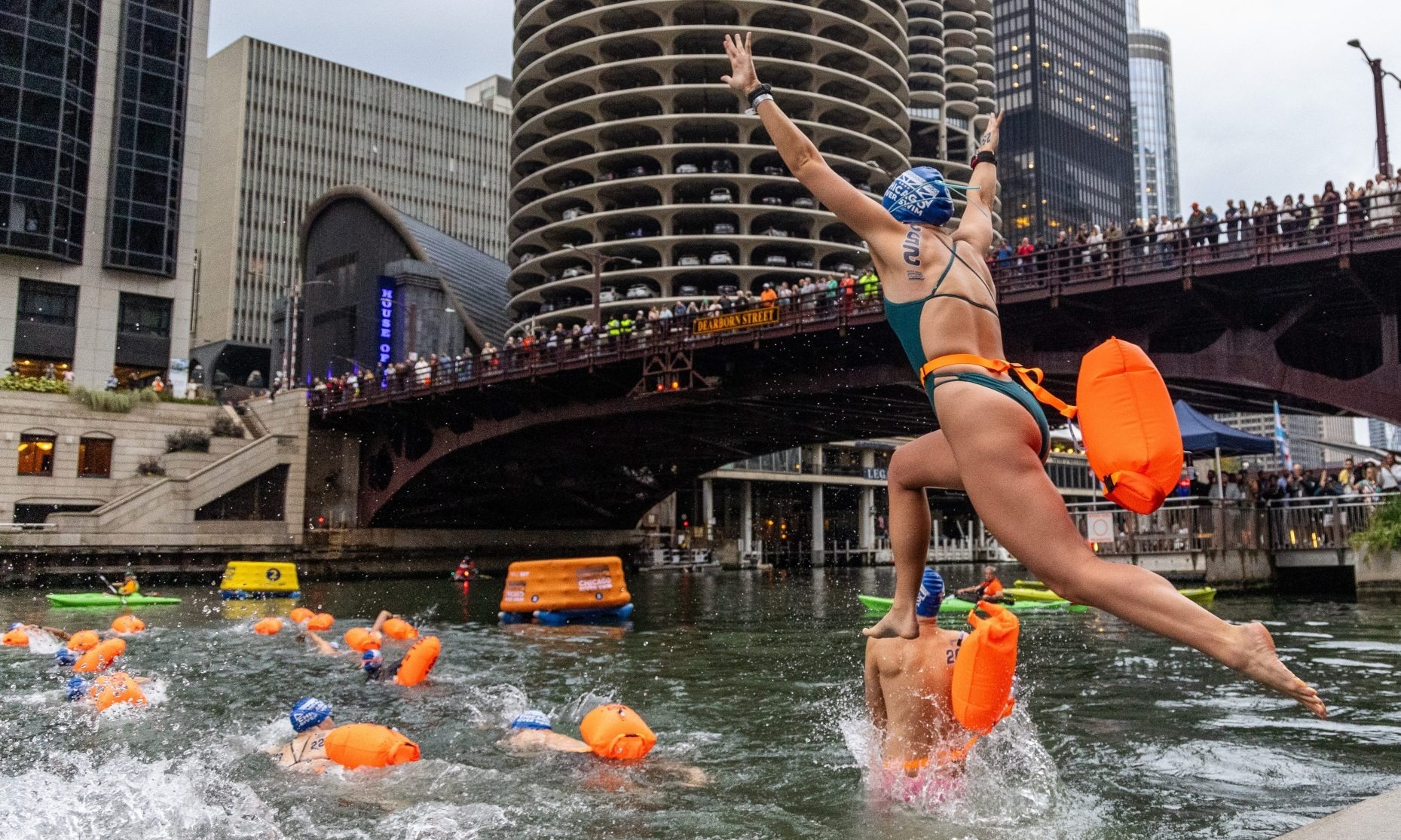On 21/9, hundreds of people lined up, laughing and cheering amidst the sounds of the Chicago Police Department band, before plunging into the river to complete a 1.6 km swim. This was the first Chicago River swim in 98 years, marking the river's recovery from severe pollution.
In the weeks leading up to the event, organizers regularly monitored coliform bacteria levels, ensuring the water met Environmental Protection Agency (EPA) standards and the riverbed was free of hazards.
Among the 300 swimmers was Olivia Smoliga, a Chicago suburban native and 2016 Olympic gold medalist in backstroke.
"It's amazing that they cleaned up the river and put on an event like this," she said.
Doug McConnell, head organizer and Chicago native, was moved to see hundreds swimming in the Chicago River. McConnell, co-founder of A Long Swim, has spent over a decade advocating for river swimming after witnessing the urban river swimming movement flourish in cities like Paris, Munich, and Amsterdam.
"That movement planted a seed in our minds. We're thrilled to finally have the city's support and global attention, with swim applications from across the US and 13 other countries," McConnell said, hoping the event will become annual and spread to other American cities.
 |
Olivia Smoliga, 2016 Olympic gold medalist, shows off her medal after finishing first in the Chicago River swim on 21/9. Photo: Guardian |
Olivia Smoliga, 2016 Olympic gold medalist, shows off her medal after finishing first in the Chicago River swim on 21/9. Photo: Guardian
The last Chicago River swim was held in 1927. Since then, the city banned such events due to heavy pollution.
The Chicago River's pollution stemmed from indiscriminate waste disposal. Annually, on St. Patrick's Day (17/3), people would dye the river green. In 2004, the Dave Matthews Band tour bus dumped 363 kg of human waste into the river, hitting a boat full of tourists.
Waste from riverside slaughterhouses used to flow directly into the river. The river was once so polluted that it caused deadly cholera and typhoid outbreaks, forcing the city in 1900 to reverse its flow by building a canal and lock system to prevent contamination of Lake Michigan, Chicago's freshwater source. Today, the 265 km river winds from Lake Michigan through Chicago to the Gulf of Mexico.
"We used to treat the Chicago River like it was a sewer system," said Margaret Frisbie, executive director of Friends of the Chicago River (FCR). Riverside buildings didn't even have windows facing the "smelly river," considering it separate from the city.
"Until a few years ago, people thought it was ridiculous to jump in the river," Frisbie said.
When FCR was founded in 1979 with the vision of restoring the river's ecological function, making it a place for people and wildlife, "everyone thought we were crazy," she said.
However, the US Congress later passed the Clean Water Act and established the EPA, implementing new regulations on pollutants discharged into rivers, streams, and lakes.
In Chicago, riverside slaughterhouses closed, new sewage and stormwater systems were built, and volunteer teams regularly cleaned river debris. Dozens of fish species returned, along with beavers and softshell turtles.
 |
Spectators watch the Chicago River swim from a bridge on 21/9. Photo: Chicago Tribune |
Spectators watch the Chicago River swim from a bridge on 21/9. Photo: Chicago Tribune
In 2016, the city opened a riverwalk connecting to the downtown area. Chicagoans can now enjoy riverside restaurants, bars, and scenic views.
On 12/9, FCR received an international award for its contribution to the Chicago River's transformation.
"Now there are so many people boating and enjoying the river," Frisbie said. "People want to work near the river, live near the river, be on the river. They want to reconnect with it."
"This swim is a symbol of the work we've done for the past 50 years to improve our rivers. It's proof that we have the ability to improve the environment, and we need to do it now."
McConnell, the swim organizer, noted that Chicagoans always thought the river was too dirty to swim in, but "we're proving them wrong." "The water quality will surprise people; it's cleaner than they think," he said.
Hong Hanh (According to Guardian)












